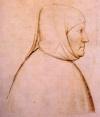Francesco Petrarch poet from Italy was born on July 20, 1304, had 70 years and died on July 19, 1374. Poems were written in Renaissance mainly in Italian language. Dominant movement is theology.
Biography
Francesco Petrarca (July 20, 1304 - July 19, 1374), known in English as Petrarch, was an Italian scholar, poet and one of the earliest Renaissance humanists. Petrarch is often called the "Father of Humanism". In the 16th century, Pietro Bembo created the model for the modern Italian language based on Petrarch's works, as well as those of Giovanni Boccaccio and, especially, Dante Alighieri. This would be later endorsed by the Accademia della Crusca. His sonnets were admired and imitated throughout Europe during the Renaissance and became a model for lyrical poetry. Petrarch was also known for being one of the first people to refer to the Dark Ages.
Petrarch is best known for his Italian poetry, notably the Canzoniere and the Trionfi ("Triumphs"). However, Petrarch was an enthusiastic Latin scholar and did most of his writing in this language. His Latin writings include scholarly works, introspective essays, letters, and more poetry. Among them are Secretum ("My Secret Book"), an intensely personal, guilt-ridden imaginary dialogue with Augustine of Hippo; De Viris Illustribus ("On Famous Men"), a series of moral biographies; Rerum Memorandarum Libri, an incomplete treatise on the cardinal virtues; De Otio Religiosorum ("On Religious Leisure") and De Vita Solitaria ("On the Solitary Life"), which praise the contemplative life; De Remediis Utriusque Fortunae ("Remedies for Fortune Fair and Foul"), a self-help book which remained popular for hundreds of years; Itinerarium ("Petrarch's Guide to the Holy Land"), a distant ancestor of Fodor's and Lonely Planet; a number of invectives against opponents such as doctors, scholastics, and the French; the Carmen Bucolicum, a collection of 12 pastoral poems; and the unfinished epic Africa.
Petrarch also published many volumes of his letters, including a few written to his long-dead friends from history such as Cicero and Virgil. Cicero, Virgil, and Seneca were his literary models. Most of his Latin writings are difficult to find today. However, several of his works are scheduled to appear in the Harvard University Press series I Tatti. It is difficult to assign any precise dates to his writings because he tended to revise them throughout his life.
In addition Petrarch collected his letters into two major sets of books called Epistolae familiares and Seniles, a plan suggested to him by knowledge of Cicero's letters. He kept out of Epistolae familiares a special set of 19 controversial letters called Liber sine nomine that contained much criticism of the Avignon papacy. These were published "without names" to protect the recipients, all of whom had close relationships to Petrarch. The recipients of these letters included Philippe de Cabassoles, bishop of Cavaillon; Ildebrandino Conti, bishop of Padua; Cola di Rienzo, tribune of Rome; Francesco Nelli, priest of the Prior of the Church of the Holy Apostles in Florence; and Niccolò di Capoccia, a cardinal and priest of Saint Vitalis. His "Letter to Posterity" (the last letter in Seniles) gives an autobiography and a synopsis of his philosophy in life. It was originally written in Latin and was completed in 1371 or 1372.
While Petrarch's poetry was set to music frequently after his death, especially by Italian madrigal composers of the Renaissance in the 16th century, only one musical setting composed during Petrarch's lifetime survives. This is Non al suo amante by Jacopo da Bologna, written around 1350. ..






